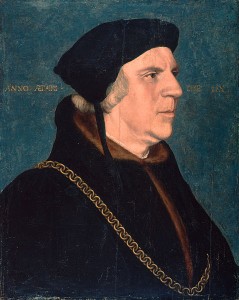 On 22nd November 1545, Henry VIII’s trusted physician, Sir William Butts, died at Fulham Manor, Middlesex, after suffering from a “dooble febre quartanz”, a form of malaria.
On 22nd November 1545, Henry VIII’s trusted physician, Sir William Butts, died at Fulham Manor, Middlesex, after suffering from a “dooble febre quartanz”, a form of malaria.
Butts acted as a royal physician at the court of Henry VIII from 1528 until his death. His patients included the King himself, queens Anne Boleyn and Jane Seymour, the Lady Mary (Mary I), Henry Fitzroy the Duke of Richmond, George Boleyn, Cardinal Wolsey and the Duke of Norfolk. He treated Anne Boleyn when she had sweating sickness in June 1528, and acted as her “talent spotter” when she was queen, helping her find and employ reformist scholars as her chaplains. He also helped advance men like Hugh Latimer and Sir John Cheke.
Henry VIII discussed his difficulties in consummating his marriage to Anne of Cleves with Butts and Dr John Chamber, explaining that “he found her body in such sort disordered and indisposed to excite and provoke any lust in him”. The marriage was later annulled due partly to this lack of consummation.
Butts was buried in a tomb against the south wall of All Saints Church, Fulham, but his tomb and brass were later destroyed. In 1627, his epitaph (a slab with verses by Sir John Cheke) was restored by Leonard Butts of Norfolk.
Here are some facts about Sir William Butts:
- Butts had Reformist sympathies
- Henry VIII sent Butts to Hever Castle to treat Anne Boleyn when she had sweating sickness in June 1528. Butts also took a love letter from Henry with him.
- He tried to convert some of the monks of Syon Abbey who were refusing to acknowledge Henry VIII as the supreme head of the Church
- Butts used his influence to advance the likes of Hugh Latimer and Sir John Cheke
- Eric Ives writes of how Butts acted as Anne Boleyn’s “talent spotter”, helping Anne to choose her chaplains “from the most promising young reformist scholars, particularly from Cambridge” and his old college there, Gonville Hall. He introduced Hugh Latimer to Anne and Latimer became one of Anne Boleyn’s chaplains. You can read more about Anne Boleyn’s household in my article “Anne Boleyn’s Household”.
- Felicity Heal writes of how French reformer, Nicolas Bourbon, approaches Butts for help in 1535 after he was forced to flee because of his beliefs. Butts told Anne Boleyn and she employed Bourbon as a tutor.
- Henry VIII discussed his difficulties in consummating his marriage to Anne of Cleves with Butts and Dr John Chamber, explaining that “he found her body in such sort disordered and indisposed to excite and provoke any lust in him”.
Notes and Sources
- C. T. Martin, Rachel E. Davies, ‘Butts, Sir William (c.1485–1545)’, rev. Rachel E. Davies, Oxford Dictionary of National Biography
- The Life and Death of Anne Boleyn, Eric Ives, p266
- Six Wives: The Queens of Henry VIII, David Starkey
- Reformation in Britain and Ireland, Felicity Heal, p228
- On this Day in Tudor History, Claire Ridgway
- 22nd November 1545 – Death of Sir William Butts, Henry VIII’s Physician, article by Claire Ridgway, posted on The Anne Boleyn Files on 22nd November 2011